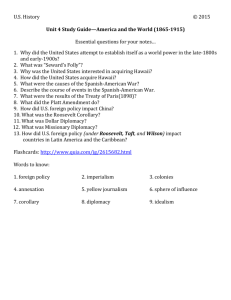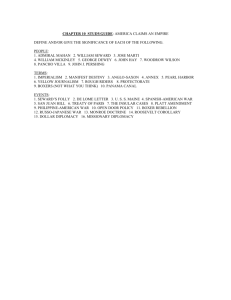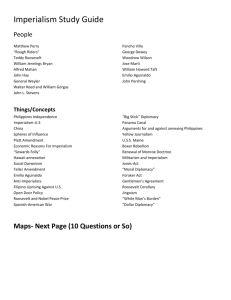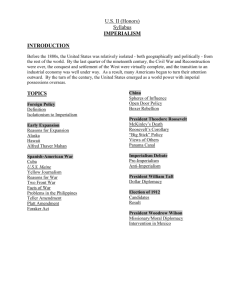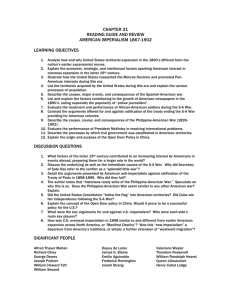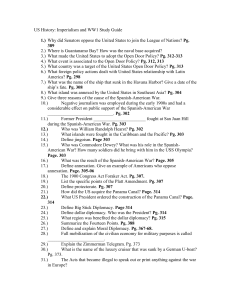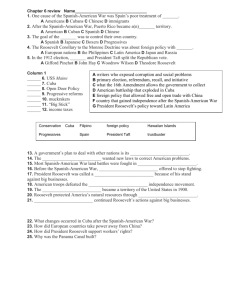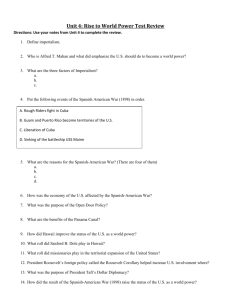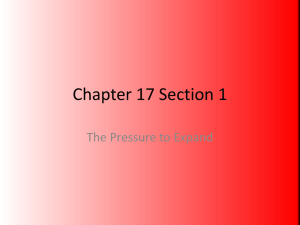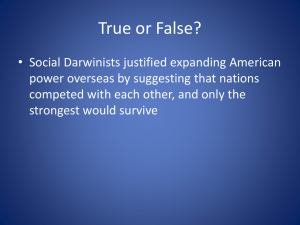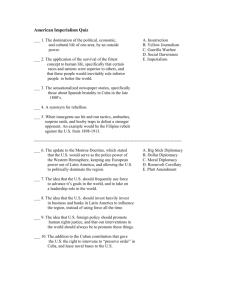IMPERIALISM TEST Study Guide Answered.doc
advertisement
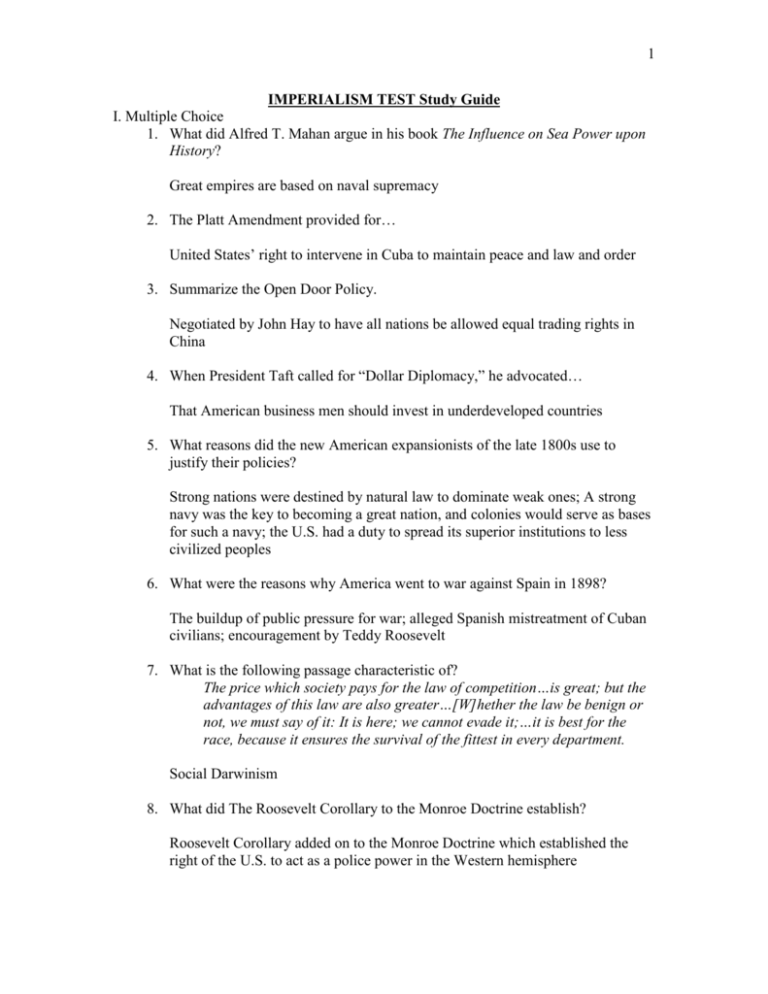
1 IMPERIALISM TEST Study Guide I. Multiple Choice 1. What did Alfred T. Mahan argue in his book The Influence on Sea Power upon History? Great empires are based on naval supremacy 2. The Platt Amendment provided for… United States’ right to intervene in Cuba to maintain peace and law and order 3. Summarize the Open Door Policy. Negotiated by John Hay to have all nations be allowed equal trading rights in China 4. When President Taft called for “Dollar Diplomacy,” he advocated… That American business men should invest in underdeveloped countries 5. What reasons did the new American expansionists of the late 1800s use to justify their policies? Strong nations were destined by natural law to dominate weak ones; A strong navy was the key to becoming a great nation, and colonies would serve as bases for such a navy; the U.S. had a duty to spread its superior institutions to less civilized peoples 6. What were the reasons why America went to war against Spain in 1898? The buildup of public pressure for war; alleged Spanish mistreatment of Cuban civilians; encouragement by Teddy Roosevelt 7. What is the following passage characteristic of? The price which society pays for the law of competition…is great; but the advantages of this law are also greater…[W]hether the law be benign or not, we must say of it: It is here; we cannot evade it;…it is best for the race, because it ensures the survival of the fittest in every department. Social Darwinism 8. What did The Roosevelt Corollary to the Monroe Doctrine establish? Roosevelt Corollary added on to the Monroe Doctrine which established the right of the U.S. to act as a police power in the Western hemisphere 2 9. The policy of imperialism in the U.S. from 1890 to 1910 was largely the result of… Demands for foreign resources 10. As what did reports of suffering in Cuba mixed with sensationalized stories become known? Yellow Journalism 11. Which policy asked nations to allow the U.S. to have trading rights in China? Open Door Policy 12. In which geographical area did the United States concentrate its effort to expand its influence during the late 1800s? U.S. concentrated its effort to expand influence on the Caribbean and Pacific in the late 1800s 13. What stimulated U.S. imperialism? Economic competition with other nations; political and military competition with other nations; a belief in the moral superiority of the Anglo-Saxon culture 14. What did the Roosevelt Corollary build upon? Monroe Doctrine 15. Which of the following best reflects anti-imperialist sentiments? A. “It is not necessary to own people to trade with them.” B. “The expansion of our trade and commerce is the pressing problem.” C. “Is there no nation wise enough, brave enough to aid this blood-smitten land?” D. “Fate has written our policy for us; the trade of the world must and shall be ours…” 16. Which country did not come under some form of U.S. control as a result of the Spanish-American War? Hawaii 17. What denied U.S. citizenship to Puerto Ricans and gave the President the power to appoint the governor and members of the upper house of legislature? Foraker Act 3 18. What impact did the Spanish-American War have on the United States international relations? U.S. emerged as a world power 19. List some of the reasons the United States annexed some of the Pacific islands in the late 1800s? To obtain exclusive rights to minerals and other raw materials To obtain fueling stations for the United States To satisfy the demand for territorial expansion 20. General John J. Pershing led a force of 15,000 soldiers into Mexico an attempt to capture whom? Pancho Villa 21. What was the most important motive for United States imperialism in the late nineteenth and twentieth centuries? To open new markets for American-made goods 22. The Boxer Rebellion was an attempt by Chinese revolutionaries to do what? An attempt by Chinese revolutionaries to remove foreign influence from China 23. The United States gained control of the land it needed to build the Panama Canal by… The United States gained control of the land it needed to build the Panama Canal by encouraging and supporting Panamanian independence 24. What was the policy of using the U.S. government to guarantee loans made to foreign countries by American business-people? Dollar Diplomacy 25. Who were the Rough Riders? A unit led by Theodore Roosevelt in the Spanish-American War 26. Queen Liliuokalani was overthrown by ____________ By American planters backed by U.S. Marines when Queen Liliuokalani attempted to restore more power to the native Hawaiians. American planters 4 formed a militia and forced the Hawaiian government to draft a new constitution that allowed them more representation. 27. Jingoism involves having strong feelings of: Aggressive nationalism 28. What were the achievements of “Seward’s Folly?” In 1867, Secretary of State William Seward negotiated the purchase of Alaska from Russia. Most people in the US thought the territory was useless. Seward, however, correctly saw Alaska as a land rich in natural resources (timber, oil, etc.) and full of great economic potential for the United States 29. Why did United States Navy Commodore George Dewey lead an attack on ships in the Manila Bay during the Spanish-American War? Led an attack on ships in the manila Bay during the Spanish-American War because Manila Bay was ruled by Spain, and the ships belonged to the Spanish 30. From 1900 to 1915, a basic aim of United States foreign policy was to _______ Promote United States influence in Latin America II. Identify the significance of five of the following terms in 3-4 complete sentences: Moral Diplomacy (spreading of democracy around the world) “Splendid Little War” (name associated with Spanish-American War given by Ambassador to England about the small amount of casualties of this war compared to the Civil War) USS Maine (its sinking caused further tensions with Spain) Sanford B. Dole (was a governor, lawyer, and judge in Hawaii and advocated westernization of Hawaiian government) Philippine-American War (started in Manila; fought for 3 years until the establishment of the civilian colonial government of Governor-General William Howard Taft; Treaty of Paris ratified in 1899 which ceded Philippines, Guam, and Puerto Rico to U.S. in exchange for $20 million) Seward’s Icebox (another name for Seward’s Folly with the purchase of Alaska) Big Stick Diplomacy (use military force to influence other countries) Imperialism (the policy of a larger country gaining control over a smaller country)
